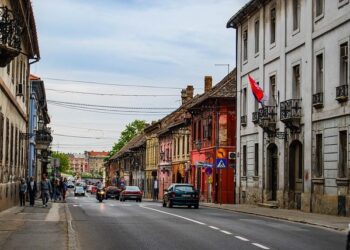Serbia’s Pursuit of Affordable Energy: A Diplomatic Tightrope
In a significant diplomatic endeavor, Serbian President Aleksandar VuÄŤić is set to engage in vital discussions with Russian President Vladimir Putin. The primary aim of these talks is to secure affordable natural gas for Serbia, especially as the energy sector undergoes turmoil due to geopolitical tensions and economic fluctuations. With Europe currently facing an ongoing energy crisis, this meeting will not only address Serbia’s immediate energy needs but also delve into the broader implications of Russia’s role as a crucial gas supplier in the region.Given Serbia’s significant reliance on Russian energy imports, VuÄŤić’s negotiations arrive at a critical juncture that underscores the delicate balance of power and economic dependence amid an increasingly volatile global landscape.
Addressing Energy Issues: Strategic Goals for Serbia
As Serbia navigates challenging economic conditions, President Vučić’s recent conversations with Putin are focused on securing low-cost gas supplies. The current geopolitical climate and volatility in the energy market have prompted Serbia to seek more favorable agreements. Recognizing the pressing need for affordable energy solutions, Vučić aims to bolster national energy security while alleviating financial pressures on households and businesses alike. This strategic engagement not only highlights Serbia’s dependence on Russian gas but also its efforts to negotiate terms that could stabilize local prices.
To combat rising costs and economic challenges, Serbia has outlined several key objectives aimed at enhancing its energy framework:
- Diversification of Energy Sources: Broadening beyond traditional suppliers by integrating renewable initiatives.
- Investment in Infrastructure: Upgrading pipelines and facilities for improved efficiency and reliability.
- Consumer Protection Measures: Implementing regulations designed to shield consumers from unpredictable price spikes.
The quest for low-cost gas also involves exploring regional partnerships aimed at fostering a more competitive market environment. These initiatives are essential not just for economic stability but also for promoting greater independence in sourcing energy supplies. As negotiations advance, their outcomes will considerably influence Serbia’s resilience within an increasingly intricate global context.
Vučić Meets Putin: Securing Favorable Gas Pricing Agreements
The recent dialogues between Serbian President Aleksandar Vučić and Russian leader Vladimir Putin underscore the critical importance of securing stable energy resources for Serbia’s future prosperity. Amid fluctuating prices across Europe, there is an urgent need to solidify favorable contracts that can provide stability within the national economy. In his pursuit of reducing costs effectively, Vučić seeks terms that would not only lower gas prices but also ensure reliable supply chains from Russia—an indication of continued dependency even as geopolitical dynamics shift rapidly.
The expected outcomes from this high-stakes dialog include:
- Sustained Gas Contracts: Establishing long-term agreements aimed at ensuring price consistency over time.
- Enhanced Supply Capacity: Expanding infrastructure capabilities to facilitate increased gas flow from Russia into Serbian markets.
- Catalyzing Investment Opportunities: Encouraging partnerships in joint ventures related to regional projects beneficially impacting both nations involved.
This strategic conversation is vital as it allows Serbia to navigate its economic necessities while considering political implications tied closely with its ongoing reliance on Russian resources—a reflection of broader aspirations toward achieving greater autonomy amidst upcoming regional challenges ahead.
Assessing Energy Strategy: Implications for Regional Stability
The pursuit of cost-effective natural gas from Russia—illustrated by President VuÄŤić’s meeting with President Putin—raises critically important questions regarding Serbia’s overall approach towards its energy strategy along with potential impacts on regional stability.The country’s dependency on Russian sources remains central within its foreign policy narrative characterized by balancing European integration against historical ties with Moscow.
This reliance solidifies both position within Southeast Europe’s evolving market yet concurrently exposes vulnerabilities linked directly back into geopolitics surrounding these relationships.
A core component driving this strategy includes establishing<strong key infrastructure projects, such as constructing new pipelines alongside expanding storage facilities designed specifically towards enhancing overall security while attracting foreign investments.
- Evolving Economic Dependencies:: Potential repercussions should tensions escalate between Western powers affecting trade relations adversely impacting local economies reliant upon consistent supply chains;
- Bilateral Cooperation Opportunities :: Collaborations among Balkan neighbors could diversify sources reducing singular supplier dependencies;
- <Strong alignments towards EU Integration :: Navigating compliance issues concerning EU regulations presents challenges requiring careful consideration when forming partnerships moving forward;
As these complexities unfold through various partnerships formed or maintained throughout this process—the decisions made regarding future engagements will undoubtedly shape prospects surrounding long-term stability across regions involved.
Conclusion: A Crucial Moment in Energy Diplomacy
In summary ,President Aleksandar Vucic ‘s ongoing negotiations alongside Vladimir Putins’ leadership signify crucial efforts directed toward obtaining accessible resource allocations amidst volatile international markets. As crises continue reshaping alliances globally ,Serbia ‘s dependence upon russian sourced fuels may further complicate relations established previously amongst western nations .The results stemming forth from such dialogues possess far-reaching consequences extending beyond mere domestic concerns influencing wider dynamics present throughout southeastern europe .All eyes remain focused intently upon developments arising out these significant meetings shaping paths forward ahead.














![Poland and France push ahead with defense pact after Paris talks [VIDEO] – TVP World](https://europ.info/wp-content/uploads/2026/01/3036754-poland-and-france-push-ahead-with-defense-pact-after-paris-talks-video-tvp-world-120x86.jpg)

